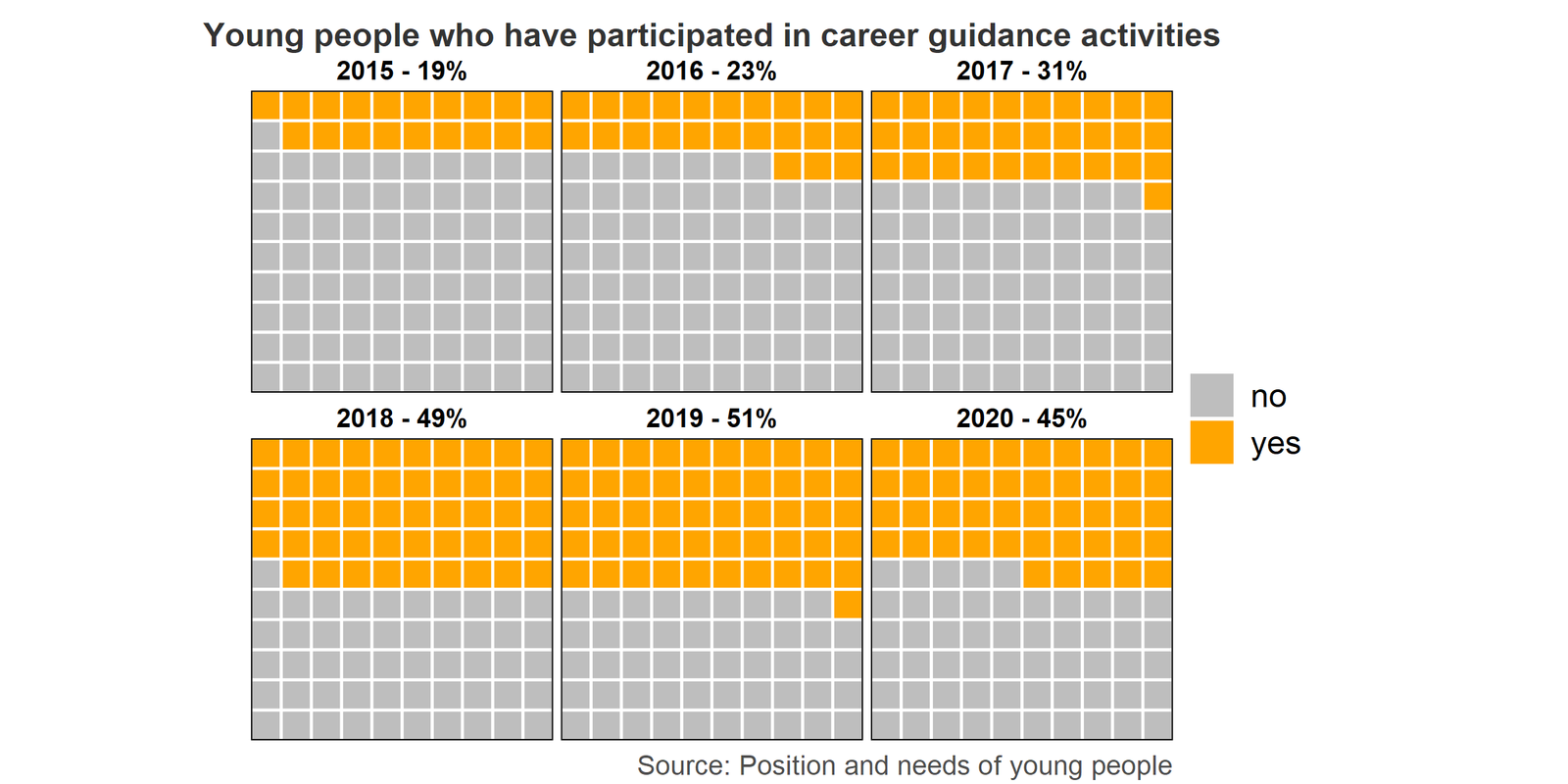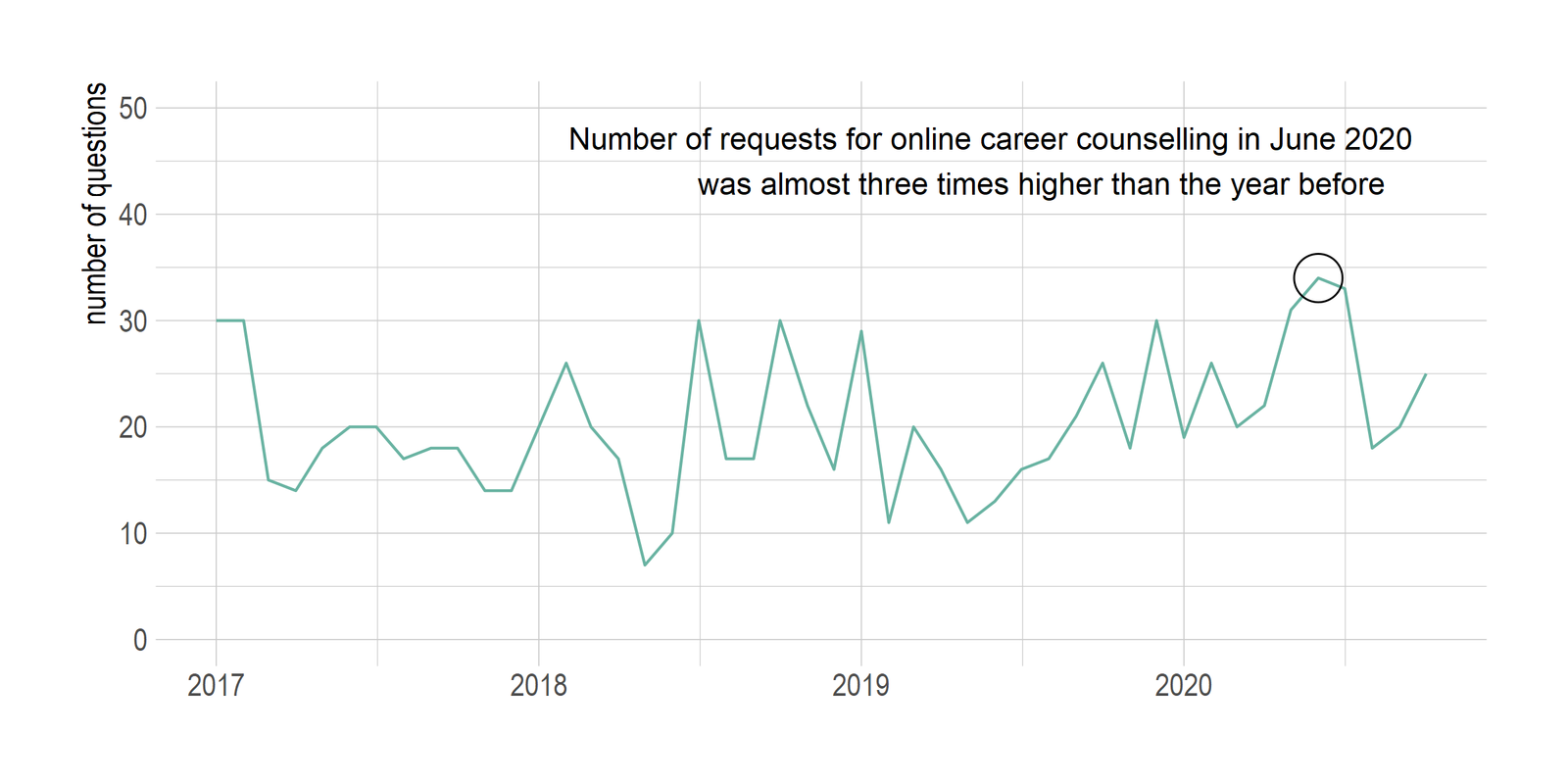Many decisions that are being made today, in the world of uncertainty and instability, are harder than usual. How to choose a secondary school or higher education institution in the light of increasing unemployment, how to face job loss and how to think about career development in these circumstances? These questions are not new, but the challenges are different. To ensure adequate support, at this moment in many countries there is a proposal to strengthen measures for career guidance and counselling (CGC).
Career guidance and counselling represent a set of services and activities intended to assist people to make educational, training and occupational choices, to manage their career and to consider and reconsider work, leisure and learning in the light of new information and experiences and take both individual and collective action as a result of this.[1]
According to the most recent international research, career guidance practitioners and other professionals report that there is an increase in demand for career guidance services. Through this research, supported by international organizations such as European Training Foundation, International Labour Organization, Organization for Economic Development and Cooperation and others,[2] the main trends regarding career guidance and counselling and the pandemic are described. What the comparison with trends in Serbia reveal?
A great number of young people does not receive CGC services
In the mentioned international research study, increasing demand for career guidance services by end-year students and apprentices has been recorded. We do not have information whether the increase of this kind has been recorded in Serbia, but the recently published research report Position and needs of young people, conducted in 2020, showed that there still a great percentage of young people, over half of them, who report never to have been included in career guidance and counselling activities.

This percentage, which for a couple of years was decreasing, in 2020 has increased for the first time, which is worrying considering the necessity of support to young people at this moment when it is assessed that they are one of the groups which are likely to be highly negatively impacted by the pandemic.
The important trend is also that among those young people who said that they have received CGC services, there is an increasing number of those who report having received these services through the education system, by schools and universities, which is in accordance with numerous measures for improvement of access to CGC services in the formal education system.
The support to the career development of adults is not adequate
It is recognized as crucial that career guidance is available to individuals of any age and at any point throughout their life. Although employed persons are not the first group which comes to mind in this context, they are one of the groups which are increasingly searching support, especially those who are working in vulnerable sectors.
However, the data we have, which has been collected via international project Connect! in which Serbia participates, indicate that companies are not using career development techniques of their employees enough. There are exceptions in this area, especially among large companies, however, additional surveys show that these services are the most frequently available to new employees, potential talents and managers, and that other groups of employees have limited access to these measures.
Career guidance is increasingly conducted online
Like many other activities, career counselling and delivering career information are nowadays more often conducted online. In most countries, the existing web-portals which include information on education options and labour market are being used, as well as options of telephone and online career counselling. In some countries, new approaches are being applied – including greater use of social networks and the development of new online services. Of special importance is the timely dissemination of information on future skills needs and labour market changes.

Concerning the situation in Serbia, research conducted by BOS showed that there has been an increase in the number of requests of young people for online career guidance, especially in the period of schools’ closures. This indicates that there is a need for greater availability of career counselling which is conducted online.
Greater cooperation is needed
.png)
Career guidance and counselling in Serbia has been recognized in all strategic documents in the areas of employment, education and youth, as well as in legal framework. Unlike some neighbouring countries, such as Montenegro and Croatia, after the action plan of the Strategy of career guidance and counselling has expired, in the recent period, there have not been any planning documents at the national level solely devoted to career guidance and counselling.
The most recent overview of the state of career guidance and counselling policies and practice in Serbia, developed within the project of European Training Foundation, reviews institutional and organizational capacities and capacities of career guidance and counselling practitioners and shows that in each of these areas there is significant progress and good practice examples. An important step has been made when The Rulebook on standards of career guidance and counselling services has been adopted, which has been followed by activities for ensuring its implementation, including disseminating information on standards, amending legal documents, conducting training and promotion activities. However, since the pandemic has started, there have not been any new, specific policy measures aimed at the increase of availability of career guidance and counselling services.
Although many institutions and organizations are working on career guidance, there are still no established coordination mechanisms, which are crucial both from the policy perspective – to avoid fragmentation and duplication of effort, and from the individual perspective – to more easily recognize which services are available to them.
New policy measures in the area of career guidance and counselling are needed
The current situation has instigated numerous international organizations and expert institutions which work on career guidance and counselling to send the message through analysis and reports that career guidance and counselling is now needed more than ever. Taking into account the data available for Serbia, several recommendations can be made:
# To support online career guidance and counselling services for a greater number of individuals. Career counselling conducted over the telephone should be made available, especially for certain groups of people who have limited access to the internet.
# The activities for improvement of availability of data on occupations, needed skills and labour market situation should be conducted. The online system containing relevant information for career guidance should be established containing all available information in the format accessible to individuals.
# Development of career guidance practitioners’ competencies should be supported, especially concerning their competencies for providing career information and career counselling. Moreover, career guidance practitioners also need financial support to improve the availability of career guidance services to a greater number of individuals.
# To avoid fragmentation and duplication of effort, and to enable all individuals easier access to career guidance services, a decision on establishing working group or another institutional arrangement for the development of policies and systems of career guidance should be adopted. This group would gather representatives of the public sector working on education and employment policies, as well as representatives of other stakeholders, including civil society organizations.
# Career guidance and counselling has an important role in recovering from the consequences of the pandemic, not only concerning employment but also lifelong learning and social inclusion. Thus, it needs to have an important place in strategies that refer to employment, education and youth, and since the increase in the availability of these services must be fast, systematic and well-adjusted to the needs of individuals, the recommendation is to also to adopt a program, policy document, on the improvement of career guidance and counselling system in Serbia.
[1] Organization for Economic Co-Operation and Development. (2004). Career guidance and public policy: Bridging the gap. Paris: OECD; Hooley, T., Sultana, R. & Thomsen, R. (2018). Career Guidance for Social Justice. New York: Taylor & Francis.
[2] Moreover, research is also supported by Cedefop, European Commission, UNESCO and the International Centre for Career Development and Public Policy. More information: Cedefop; European Commission; ETF; ICCDPP; ILO; OECD; UNESCO (2020). Career guidance policy and practice in the pandemic: results of a joint international survey – June to August 2020. Luxembourg: Publications Office of the European Union. http://data.europa.eu/doi/10.2801/318103
[3] Ibid.
Aleksandra Djurovic, Belgrade Open School
